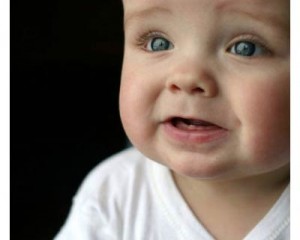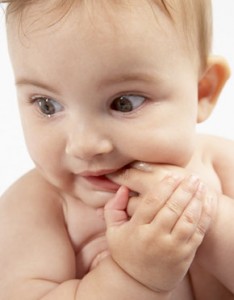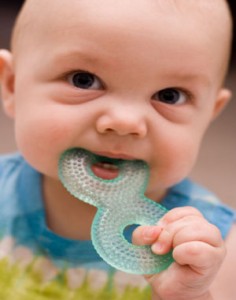One of the most common mistakes parents (and grandparents) make is to blame teething for everything, including sleep problems. Fever, irritability, diarrhea and fits are some of the many conditions that are associated with teething in children but how far are they true? First of all, let us clarify the basics of the ‘debut’ of baby teeth.
What is teething?
Baby teething is a normal development process in your baby whereby the primary teeth start emerging from the gums. The process is generally painless or may cause a little soreness on the gums especially when the molars erupt.
When do teething start?
Teething age varies from baby to baby but the first baby tooth usually erupts around 6 months of age. Some infants may get them earlier at 3 months or some do not have them till their first birthday.
What are the signs and symptoms of teething?
- Your child eagerly wants to chew or want to put his or her hand and fingers into the mouth.
- Red and swollen gums at the site of tooth eruption.
- Most babies drool more than usual.
- Some infants may become fussier.
- Some may also have a mild increase in body temperature (less than 101°F).
What symptoms are not caused by teething?
- Fever. Because the eruption of teeth is a normal physiologic process, the association with fever and systemic disturbances is not justified. Any fever that shows more than 101°F in temperature is NOT associated with teething.
- Rash
- Marked irritability
- Diarrhea
- Colds
Other serious illnesses like seizures, ear infection, infection of the respiratory tract and even death have been incorrectly attributed to eruption of teeth.
Does teething cause fevers in children?
Many still believe that a child can have teething fever (even health-care providers!) but results from well-conducted medical research have shown that temperature over 101°F is NOT associated with teething. If a fever is present during this period, it is a pure coincidence and must be caused by something else.
However if you were to compare a teething baby’s temperature with a non-teething one, you may find the child’s temperature is slightly elevated but the rise is not significant enough to be called a fever. Then why do many babies develop high temperature when they are teething?
Most tooth eruption occur between 4 to 15 months and during this period, babies become more active and mobile. As they learn to crawl and walk, they immediately become more exposed to a wider range of infections. Touching objects and putting them into their mouth is a common thing to do when your baby starts exploring around, and by doing so it is a perfect way to catch a virus which may then lead to fever.
How do I manage my baby’s teething pain?
During the day, your baby may be able to distract him or herself from the pain but the pain can be overwhelming when he or she is sleeping alone at night. Therefore you may try these few teething remedies:
- Try to be supportive and be available when your baby is in pain.
- Help ease your baby’s discomfort by offering something cold and firm to chew on, like a damp washcloth or a chilled pacifier or teething ring. Teething rings should be attached to the baby’s clothing, not tied around the neck as it might cause strangulation. Solid, silicone-based teething rings are recommended for the liquid ones may leak if damaged.
- Try not to use frozen objects which may cause frostbite.
- Do not offer any hard foods, like raw carrot, to your baby which may cause choking.
- Try not to give your baby teething biscuits which may contain lots of sugar.
- Massaging your baby’s gums with your finger when teeth are starting to emerge can help the tooth break out.
- Acetaminophen or teething tablets can help relieve persistent discomfort but consult with your doctor before providing any.
- Over the counter teething gels which contains topical pain killer can provide pain relief but should be used in caution and only as directed by a doctor.
- Inflammation of the gums before complete eruption of the crown of the tooth may cause temporary soreness but it will usually subside within a few days. It is not necessary to remove the gum flap covering the tooth to help it emerge.
When should I see a doctor?
If your baby has a fever (above 101°F in temperature), diarrhea, vomiting and other serious issues like seizures, it is advised to bring him or her to a doctor.


